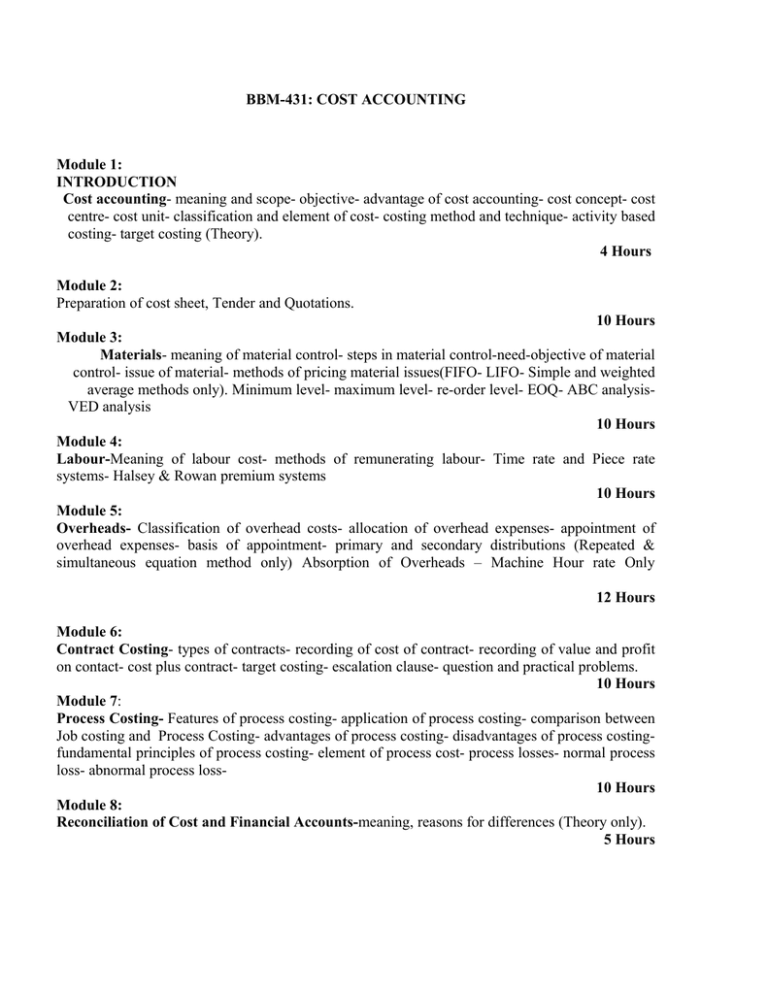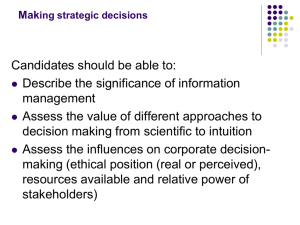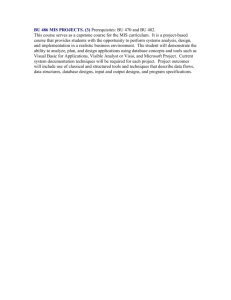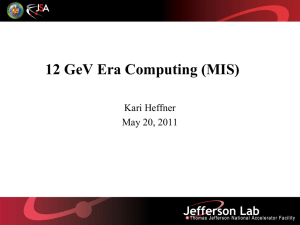
BBM-431: COST ACCOUNTING
Module 1:
INTRODUCTION
Cost accounting- meaning and scope- objective- advantage of cost accounting- cost concept- cost
centre- cost unit- classification and element of cost- costing method and technique- activity based
costing- target costing (Theory).
4 Hours
Module 2:
Preparation of cost sheet, Tender and Quotations.
10 Hours
Module 3:
Materials- meaning of material control- steps in material control-need-objective of material
control- issue of material- methods of pricing material issues(FIFO- LIFO- Simple and weighted
average methods only). Minimum level- maximum level- re-order level- EOQ- ABC analysisVED analysis
10 Hours
Module 4:
Labour-Meaning of labour cost- methods of remunerating labour- Time rate and Piece rate
systems- Halsey & Rowan premium systems
10 Hours
Module 5:
Overheads- Classification of overhead costs- allocation of overhead expenses- appointment of
overhead expenses- basis of appointment- primary and secondary distributions (Repeated &
simultaneous equation method only) Absorption of Overheads – Machine Hour rate Only
12 Hours
Module 6:
Contract Costing- types of contracts- recording of cost of contract- recording of value and profit
on contact- cost plus contract- target costing- escalation clause- question and practical problems.
10 Hours
Module 7:
Process Costing- Features of process costing- application of process costing- comparison between
Job costing and Process Costing- advantages of process costing- disadvantages of process costingfundamental principles of process costing- element of process cost- process losses- normal process
loss- abnormal process loss10 Hours
Module 8:
Reconciliation of Cost and Financial Accounts-meaning, reasons for differences (Theory only).
5 Hours
Module 9:
Cost Audit- meaning of Audit, definition of Cost Audit, type of cost audit. Objective of cost audit,
advantage of cost audit Auditing techniques, cost audit programme; functions of cost auditors:
difference between cost audit and financial audit.
4 Hours
Reference Books
1. Cost Accounting- M.N.Arora, (Himalaya Publishing House)
2. Cost Accounting- S.P. Jain and K.L Narang (Kaylani Publishers)
3. Cost Accounting- Mahabaleswara Bhatta (Himalaya Publishing House)
4. Cost Accounting- J. Made Gowda (Himalaya Publishing House)
BBM-432: RESEARCH METHODOLOGY
To understand the various components of research and to provide a cross discipline
perspective on research methodology.
MODULE 1:
RESEARCH METHODOLOGY: AN INTRODUCTION
Meaning of research, objectives of research, significance of research, research and scientific
method, objectivity, importance of knowing how research is done, Types and methods of research,
Research process, criteria of good research, Limitations of social research, Ethics in social science
research.
(8 hours)
MODULE 2
Business Decisions : Concept and process – Research as a decision support system – component
business research dimensions, Research for marketing Decisions , Research for personnel
decisions, Research for financial decisions)
(10 hours)
MODULE 3:
DEFINING A RESEACH RESEARCH PROBLEM
Meaning of a research problem, Selecting the problem, necessity of defining the problem,
Technique involved in defining a problem, An illustration, Conclusion
(12 hours)
MODULE 4:
RESEARCH DESIGN
Meaning of Research design, need for research design, basic features of a good design, important
concepts relating to research design, different research designs – Exploratory research design and
conclusive research design: Descriptive research and causal research, Basic principles of
Experimental Designs.
(10 hours)
MODULE 5:
SAMPLING
Introduction, Sampling techniques or methods, Probability sampling techniques: Simple random
sampling, Systematic sampling, stratified sampling, cluster sampling, Non probability sampling:
Convenience sampling, Judgmental sampling, quota sampling, snowball sampling, Sampling
design and choice of sampling techniques, Sample size, Sampling and Non-Sampling errors.
(12 hours)
MODULE 6:
METHODS OF DATA COLLECTION
Collection of Primary data, Collection of data through questionnaire, Collection of data through
schedules, difference between questionnaires and schedules, Guidelines for constructing
questionnaire/schedule, some other methods of data collection.
Collection of secondary data, Selection of appropriate method of data collection
(8 hours)
MODULE 7 : PROCESSING, ANALYSIS AND INTEREPRETATION OF DATA
Hypothesis testing, Chi square, Analysis of variance: One way analysis of variance, Analysis of
covariance, Processing of data – Introduction, editing, classification and coding, Transcription,
Tabulation and Graphical representation.
Meaning of interpretation, Why interpretation? Technique of Interpretation, Precaution of
interpretation.
(8 hours)
MODULE 8 :
REPORT WRITING
Significance of report writing, Different steps in Writing report, Layout of a research report, Types
of Reports, Mechanics of writing a research report, precautions for writing research reports,
Introduction to SPSS
(7 hours)
Suggested books:
O.R.Krishnaswami, Methodology of research in social sciences, Himalaya publishing house
C.R. Kotari, Research methodology,Wishwa prakashan, second edition
Naresh K Malhotra, Marketing research:An applied orientation, Pearson Prentice hall, Fourth
edition
BBM-433: INDIAN FINANCIAL SYSTEM
MODULE-I
10 hrs
Financial System
The Structure of the Financial System – Functions of the Financial System – Financial
System and Economic Development – Reforms in Financial Sector in India.
MODULE-II
16 hrs
Financial Institutions:
The Reserve Bank of India – Functions of Reserve Bank of India – Monetary Policy and
Credit Control – Commercial Banking – Non – Banking Financial Intermediaries –
Development Banks Insurance Business in India – The Insurance Regulatory and
Development Authority(IRDA)
MODULE-III
16 hrs
Financial Markets and Financial Instruments:
Money Market Role and Structure of the Money Market – New Issue Market - Call
Money Market – Bills Money Market – Foreign Exchange Markets.
Financial Instruments
MODULE-IV
14 hrs
Capital Market
Government and Industrial Securities Markets:
Integration of Money and Capital Markets – Equity and Loan Capital – Role and
Functions of Stock Exchanges – The National Stock Exchange of India – Over the
Counter Exchange of India – Discount and Finance House of India – Securities and
Exchange Board of India – Stock Holding Corporation of India –Market for Derivatives
MODULE – V
10 Hrs
Financial Services
Merchant Banking, Mutual Fund, Lease financing Factoring Credit Rating and Venture
Capital Finance
.
MODULE-VI
5 hrs
International Finance Markets:
Nature, Organization and Participants – offshore Financing Instruments – Role and
Functions of the Asian Development Bank IMF and World Bank.
BOOKS FOR REFERENCE:
1. Gordon And Natarajan Financial Services And Markets
2. V.A Awadhani Financial Services And Markets
3. Vasant Desai The Indian Financial System And Development
4. G. Ramesh Babu Indian Financial System
BBM-434: MANAGEMENT INFORMATION SYSTEMS
MODULE:I
A SIMPLE MODEL OF MIS : Meaning of MIS, Definition, A Simple model of MIS, What an
information system, Characteristics of information, Classification, What is a system, Computer
based information systems, Technical operation of a CBIS, Business data processing, Data
processing cycle, A business perspective of information systems, Characteristics of MIS.
(05)
MODULE II:
MANAGEMENT INFORMATION SYSTEMS: What are management information systems,
Features of MIS, Importance of management information systems, Pyramid structure of MIS, MIS
versus data processing, Structure of MIS, Subsystems of MIS, The Conceptual structure of MIS,
Security and international issues of MIS, MIS issues of a multinational organization?
(08)
MODULE III:
THE CONCEPT OF DATA PROCESSING: Database, Major issues in data management, File
management, File organization, File based systems problems, Objectives of DBMS, Database
concepts, Database models, Difference between models, Dataware Housing, Data Mining.
(07)
MODULE IV:
MIS AND NETWORKS : Batch Processing, Online Processing (Quick Response Systems),
Components of a Telecommunication Systems, Communication Networks, Network Topologies,
Implementation of LANS – Transmission Media, Wireless LAN (WLAN), Internet, World Wide
Web (WWW), E-Mail, Intranet.
(08)
MODULE V:
ANALYSIS AND DESIGN OF MIS: Software Engineering, Systems Analysis, System Design,
Systems Analysis and Design, Entity Relationship Diagram, Systems Development life Cycle,
Project Management.
(08)
MODULE VI:
MIS DEVELOPMENT & IMPLEMENTATION: MIS Planning, Project Preparation, Needs
Analysis, MIS Design, Selection, MIS Implementation, Management Challenges.
(05)
MODULE VII :
HUMAR RESOURCES INFORMATION SYSTEMS: Types of personnel administration data
systems, Employee Profile system, Employment control reporting system.
(05)
MODULE VIII:
FINANCIAL / OPERATIONS DATA SYSTEMS: Payroll data system, Accounts payable
systems, Accounts receivable system, Materials requirement planning (MRP), Manufacturing
Resource Planning (MRP II).
(08)
MODULE IX:
DIFFERENT TYPES OF INFORMATIONS SYSTEMS : Group decision support systems
(GDSS), Executive information systems (EIS), Expert systems, Artificial intelligence, ERP, ECRM, Transaction processing systems, Knowledge work and office automation systems, Computer
crimes and ethics, Information security and control, Information out sourcing and Data Resource
Management.
(06)
BOOKS FOR REFERENCE:
1. Management information systems by James O’Brien Golgotha publications.
2. Management Information Systems By Davis And Olson Published by TATA MC GRAW
HILL
3. Management information systems by THOMAS THARAKAN SURABHI
PUBLICATIONS
BBM-435: ENTREPRENEURSHIP DEVELOPMENT
OBJECTIVES
Entrepreneurship has emerged as a profession. Hence the need to familiarize the
students about specific educational and learning programs and the assistance
offered in order to provide an insight to start their own venture.
MODULE – I: Introduction to Entrepreneurship:
(12 HOURS)
The concept of Entrepreneurship, Entrepreneurial competencies, functions of an Entrepreneur,
types of Entrepreneurs. Myths of Entrepreneurship, The concept of Entrepreneurship-theories. The
role of Entrepreneurship in economic development. Intrapreneurship.
MODULE – II: Entrepreneurship development in India:
(10 HOUR)
Factors affecting Entrepreneurship, location mobility of Entrepreneurs, Entrepreneurship
development programs- need, objective and phases of Entrepreneurship development programs.
Institutions of Entrepreneurship Development.
MODULE – III: Creativity and Innovation:
(8 HOUR)
The creative process, Search for Business ideas, Selection of Product/Service, Product innovation,
Product planning and development strategy , New Product Development, Services IndustriesHuman side of an enterprise
MODULE – IV: Establishing an Enterprise:
(12 HOUR)
The start-up process, Project identification, Selection of the product, Project formulation,
Assessment of project feasibility, Market survey, Risk Analysis, Break-Even Analysis. Preparation
of project report, selection of site, legal considerations and basic start-up problems.
MIODULE- V: Institutional Support to entrepreneurs:
(12 hour)
Need for institutional support – National Small Industries Corporation (NSIC), Small Industries
Development Organization (SIDO), Small Scale Industries Board (SSIB), Small Industries Service
Institutes (SISI), and District Industries Centres (DIC). Industrial Estates and IIE, Guwhati.
MODULE – VI: Project Report:
(6 hour)
Project Report – Meaning and importance. Project identification, Contents of a Project Report,
Format of a Report (As per requirements of financial institutions) Project Appraisal, Market
Feasibility, Technical Feasibility, Financial feasibility and Economic feasibility. Technical
Consultancy Organisation(TCO)
Books for reference :
1. Fundamentals of entrepreneurship
: Renu Arora
2. Small Scale & Entrepreneurship development : Vasant Desai
3. Entreprenuership development
: S.S Kankha
BBM-436: COMPANY LAW
Objectives: The objectives of this course to help the students to have basic knowledge
about the Company formation and the practices followed by the companies under the
provisions of companies act.
MODULE-I
5 hrs
Company
Meaning and definition of Company, Special features, - Kinds of Companies – features of
various types of companies – differences between Private and Public companies –
Development of Company Law in India- Objects of the Act.
MODULE-II
10 hrs
Formation of A Company
Promotion – Role of Promoters –Position of Promoters- Incorporation of a Company –
Memorandum of Association – Its contents and alteration – Doctrine of Ultra vires –
Articles of Association – Its contents – Distinction between Memorandum of Association
and Articles of Association – Constructive Notice – Doctrine of Indoor Management –
Certificate of Incorporation and Commencement of Business.
MODULE-III
10 hrs
Share Capital
Prospectus – Its contents – Statement in lieu of Prospectus – Allotment of Shares – Share
capital – Kinds of shares – Alteration and reorganization of Share capital – voting rights –
Depositories Act – Debentures –its kinds – creation of fixed and floating charges –
Borrowing powers of Companies – Mortgages and charges – Registration of charges.
MODULE-IV
Membership of a company
10 hrs
Modes of acquiring membership – Termination of Membership – rights and liabilities of
members – Register of Members.
MODULE- V
Company Management
10 hrs
Appointment, removal, disqualification, rights and duties of managerial personnel their
remuneration.
MODULE: VI
Company Meetings & Company Secretary
10 hrs
Meetings of Board of Directors – Meetings of shareholders – Statutory meeting – Annual
general meeting – extraordinary general meeting – Resolutions - Quorum – Principle of
majority rule – Protection of minority interest – Investigation – Prevention of oppression
and mismanagement – Powers of Court and Central Government
Company Secretary- Qualifications – Appointment – Duties.
MODULE: VII
5 hrs
Company Auditor:
Auditor-Appointment-Powers and Duties.
MODULE: VIII
Compromise, Arrangement, Reconstruction and Amalgamation.
5 hrs
MODULE: IX
10 hrs
Winding Up of a Company
Types of winding up – winding up by the Court – Voluntary winding up(members’
voluntary winding up and creditors’ voluntary winding up) – Winding up subject to the
supervision of the Court – Liquidator – his duties, powers and liabilities – Consequences of
winding up.
BOOKS FOR REFERENCE
1.
2.
3.
4.
Ramaiah The Companies Act 1956
N.D. Kapoor Company Law and Secretarial Practice
Maheshwari And Maheshwari Company Law and Secretarial Practice
Gulshan -Company Law






